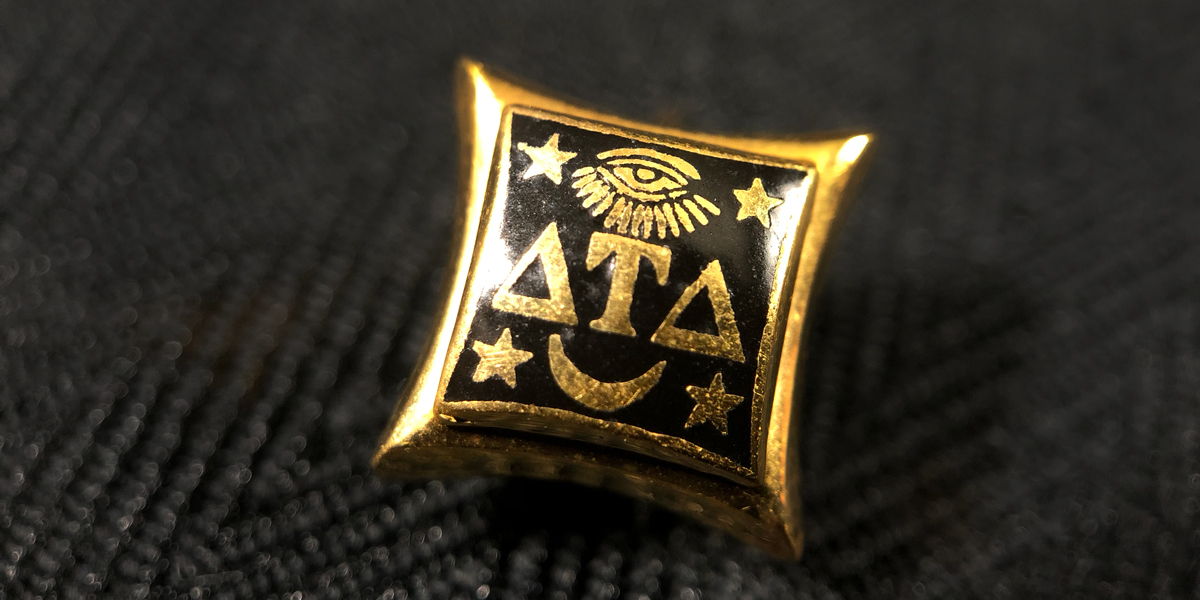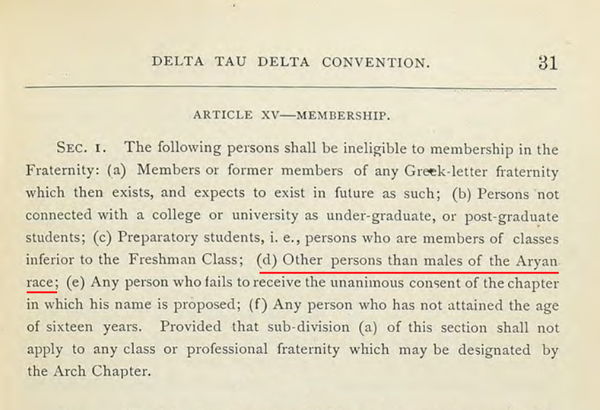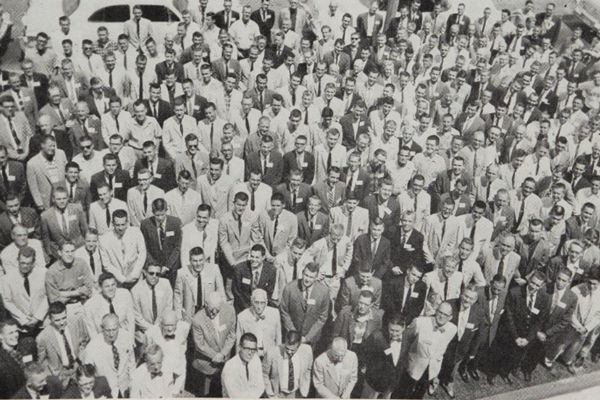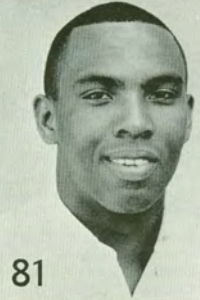Little is known of the original membership requirements for Delta Tau Delta. Most of the Fraternity’s founding documents were lost to a fire within Old Main soon after the Fraternity began at Bethany College. Clues emerge, however, when reviewing documents produced as the Fraternity began to standardize its practices. At the time, those men pursing a college education were mainly white and considered to be of a comfortable status. A cynic would simply point to the available demographic as limiting membership to affluent, white males. However, words do matter. The early Fraternity leaders could have adopted exclusionary language based on race and religious identity, but they did not. Exclusionary language in the governing documents wouldn’t be introduced until later.

1858
In the Constitution in 1858, handwritten in a cipher, there is no mention of membership qualifications.
1870
New membership requirements are adopted. No member of any other secret fraternity in any college can be eligible. To be fitted for membership in this Fraternity, a man must be firm in firm moral principles, give evidence of superior intellectual application and ability, be at least 15 years of age and have the chapter’s unanimous vote.
1883
Age raised from 15 to 16. Recognizing the policy of the Fraternity in not initiating men enrolled in high schools or preparatory school.
1887
For the first time in the Constitution, non-Aryan members were excluded.
1889
A revision was passed and ratified. The membership qualifications included article (d) “Other than males of the Aryan race.”
1899
First controversy over religion: Lowrie McClurg (Allegheny College, 1879) declared the sections of the Ritual were unconstitutional because those requirements were not in the wording of Article 1, section 1 in the Constitution, which defined requirements of membership. The disputed sections of the Ritual were: the candidate must affirm that he believes in the existence of a Supreme Intellectual Being and have a friendly attitude toward the Christian religion.
1901
At Karnea, Ritualist John A. Bolard (Allegheny College, 1878) offered an amendment to the Constitution. The amendment read, “To be fitted for membership in the Fraternity, a candidate much possess these qualifications: He must be firm in good moral principles; he must give evidence of superior intellectual ability and he must believe in the Christian religion.”
President of the Fraternity, Edwin Holt Hughes (Ohio Wesleyan University, 1889) later to be Bishop of the Methodist Church, amended the motion to read, “He must believe in a Supreme Intellectual Being.” This division of opinion regarding such requirements was not written into the membership requirements, although the Ritual required the use of a Christian prayer.
1915
The Karnea acted to strengthen the racial requirement by adding the wording “and not of the Black, Malay, Mongolian or Semitic races.” This change was passed by the Karnea.
1923
An attempt was made at Karnea to amend the Constitution by striking out language specifying ineligible races. The motion was defeated.
1946
The Committee on Constitution and Laws held a two-hour forum with 75 delegates discussing the membership requirements restricting eligibility for certain parts of the white race.
1948
The Constitution and Laws reported a proposal to strike out the clause which read, “He must be of the Aryan race and not of the Black, Malay, Mongolian or Semitic races.” A vote of 190 to 44 tabled the motion.
1950
It was discovered that the Beta Rho Chapter at Stanford University had violated the anti-Semitic clause of the Constitution by pledging Lloyd W. Dinkelspiel (Stanford University, 1950), a Jewish member. The Arch Chapter sought to address the issue. Other chapters in the east had secretly initiated Jewish members or had members keep their Jewish ancestry secret.
In his presidential address, W. Harold Bernton (Iowa State University, 1920) said in 1950, “Our Fraternity is being attacked together with other fraternities because of constitutional restrictions included in the qualifications for membership. This restriction is part of our Constitution and can only be changed by the Karnea delegates with ratification by the chapters. Should our Karnea delegates and chapters wish a change, it can be voted according to our Constitution. However, the right to change belongs to our Fraternity membership, and the decision should be ours and not dictated and influenced by others.”


1952
At Karnea, the Committee on Resolutions submitted the following: “Whereas in recent years there have been numerous discussions at Karnea and division conferences concerning the Fraternity’s membership qualifications clause, and the effect that retention, deletion or amendment of this might have on the individual chapters in the Fraternity and whereas it is highly desirable that full factual information be obtained to serve as a means of enlightened future discussion on this matter, now therefore be it resolved that the incoming President of the Fraternity by and with the consent of the Arch Chapter be authorized and directed to appoint a commission of not less than three nor more than five members of Delta Tau Delta for the purpose of gathering, studying and disseminating factual information on the problems and various aspects of the membership qualifications provision; and be it further resolved that the means of reporting and disseminating of such information be at such times in such manner that the commission shall deem appropriate.” This resolution was adopted.
1956
After much debate and many amendments, the racial restrictions were taken out of the Constitution, and new language was added reading, “In recognition of the national character of Delta Tau Delta, he must be free of attributes which makes him unacceptable to the Fraternity as a whole.” A new section was added that read, “No undergraduate chapter shall enter into a relationship giving an appearance of prospective membership with any person not socially acceptable to all members of the Fraternity.” In other words, if a member was deemed to be incompatible by any other member of the Fraternity, his membership could be rescinded.
1958
An amendment was proposed changing the procedures. The proposed change read that if any member or prospective member of the Fraternity might be of questionable acceptability, the Arch Chapter would not make the decision but would pass it to a committee of five members of the chapter concerned, all alumni of the college or university. That alumni committee would conduct an investigation and report its finding to the Arch Chapter.
1962
During the business session, despite heated debate and frank, if not insensitive comments directed to the floor at Beta Rho’s expense, in the end, a resolution passed, stating that Beta Rho would be censured for “disregarding the national character of Delta Tau Delta.” No membership qualifications were changed.
1964
There was considerable debate on the membership qualifications, but nothing changed.
1968
The Constitution was amended further to provide for a procedure whereby any member could question membership in the Fraternity of any individual based on the individual's acceptability to the Fraternity as a whole.
The Committee had drafted an amendment to the Constitution that would incorporate inclusive language. Simply called “Section 7,” the language stated, “The criteria of race, color or creed as qualifications for membership are rejected.”
The motion was passed 187 voted in favor and 52 opposed.
Following the passage of inclusive language, a motion was made to restore deleted language to Section 1 of the article, which read, “as exemplified by the Christian religion.” Though Section 7 denied creed as a requirement for membership, religion remained a requirement for membership in the Fraternity.
1970
Karnea, for the first time in a quarter-century, there was no discussion of membership qualifications. The wording which existed at the close of the long debate was essentially the same as the wording of a century earlier. Still, the understanding of it and the application of it were very different.
Since 1968, the Fraternity has not had discriminatory language in the Qualifications for Membership section of the Constitution and Bylaws.
Membership Qualifications Today
Section 1. Qualifications For Membership. To be eligible for membership in the Fraternity, a man must possess the following qualifications:
(a) He must be of high ideals and firm in accepted moral principles as taught by the great religions of the world;
(b) He must be of superior scholarship and possess those gentlemanly qualities that promote the highest type of associational brotherhood;
(c) He must receive such vote of the undergraduate chapter as is provided by the chapter bylaws, but, in any event, not less than a majority;
(d) He must be a male undergraduate, post-graduate, or professional student of the institution where the electing chapter is located, or where the Arch Chapter of the Fraternity has voted to establish a chapter, or where the Arch Chapter may authorize his initiation; and
Eligibility for membership in the Fraternity shall be limited to men of superior character and shall not be affected or determined in any manner by inappropriate or illegal discrimination. Δ
The pledging of Morrison Warren

At Stanford University, Beta Rho Chapter pledged Morrison Warren, a prominent Black athlete who was uniformly well-liked among the chapter. The chapter was found to have pledged a Black member when the chapter consultant arrived for a routine visit. Word quickly spread around campus, and the chapter was backed by a tremendous display of support from Stanford.
The university’s official statement was that if the Fraternity were to discipline Beta Rho, the entire PAC 10 would sanction Delt chapters on their campuses.
Stanford Delts quickly changed from one of being uninformed about the rules to a stance that, “No one was going to push us around.” The chapter started receiving harassing phone calls from other chapters. “How could you do this to us? To the Fraternity?” some said. Others threatened reprisals, warning that they would be sorry when Karnea got there if something was not done.
The chapter went on the offensive, writing letters to other chapters that they thought might be sympathetic to their cause.
Once at Karnea, the Stanford delegation remembers, “We were under fire from the moment we landed. The Arch Chapter wasn’t taking an upfront position on it, and that it was in New Orleans put us in the belly of the beast,” said Steve Arch (1963)
The chapter knew there were two solutions: Warren would be allowed to stay, or the members of Beta Rho would leave the Fraternity. They stated, “Warren’s involvement with us was a free and open association and had nothing to do with the fact that he was Black. He didn’t join to be a pioneer—he joined because he wanted to live in the house with us.”
The Stanford delegation, John Skeen (1963), Chipman Miles (1963) and Steve Arch, spent a great deal of time behind the scenes talking with members of individual chapters to help get the delegate votes in their camp. Their cause was greatly aided by the fact that Tom C. Clark (University of Texas at Austin, 1922), soon to be Arch Chapter president and sitting Supreme Court justice, had just participated in the landmark decision that effectively ended segregation in the schools.
According to the Stanford delegates, President Clark was unable to vote but, “He stood as a symbol of the appropriateness of what we had done.”
